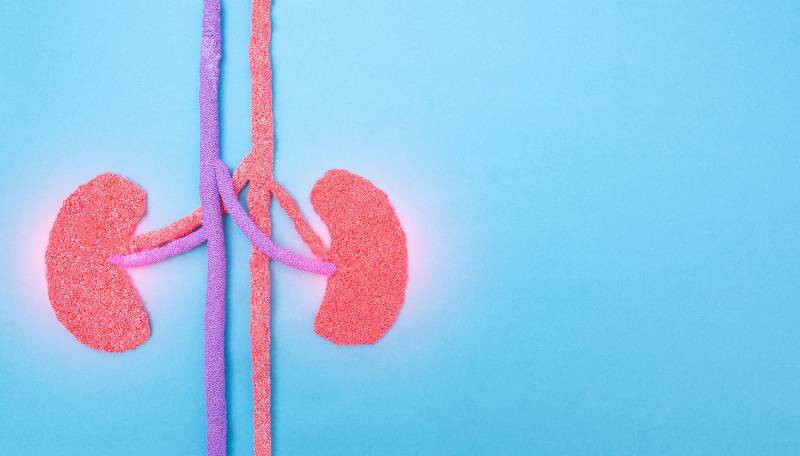I have become increasingly aware that the vast majority of people have very common misconceptions about their kidneys-- how they work, what they do, who gets kidney disease, and what can be done to keep them healthy. It turns out, most people know little about the facts of kidney health, and instead, risk their kidney health by relying on medically unproven and sometimes unsound advice about what should be done to maintain robust kidney function. As a nephrologist, I specialize in kidneys, and below are some of the most common misconceptions about kidney health and disease.
True or False: To keep my kidneys healthy, I must drink 8 full glasses of water daily to flush them out.
False. The kidneys are efficient, silent little workers that never stop, even when you are asleep. So why do most of us not urinate as much at night as we do during the day? Healthy kidneys can rid the body of an entire day's worth of waste products by producing as little as 16 ounces (2 cups) of urine. Because our body is composed of 65% water, it is very easy for healthy kidneys to find a half quart of fluid sitting around for them to do their job! When you go to sleep at night and stop drinking liquids, the kidneys will concentrate urine down to a much smaller volume. In fact, as kidneys become diseased, they do not handle fluid as efficiently, and many patients with kidney failure are on restricted fluid intake. Most kidney doctors will recommend drinking enough liquids to satisfy thirst, but there has never been any scientific proof that "flushing" the kidneys in the long term preserves kidney function. The notable exception to kidney "flushing" is patients who have kidney stones. Those patients are recommended to produce at least 2 quarts of urine daily and should drink accordingly.
True or False: If it's all about urine, if I urinate frequently, it is a good sign that my kidneys are healthy.
False. Quite the opposite. Remember in the last question, healthy kidneys can concentrate urine down to 2 cups and still effectively remove body waste. Diseased kidneys lose their ability to do this. In fact, frequent urination is one of the first signs there may be an abnormality present. Diseased kidneys that are unable to concentrate, produce large amounts of urine while not removing waste products. This results in frequent urination, and subsequently, increased sensation of thirst. Other conditions that cause frequent urination include undiagnosed or poorly controlled diabetes, prostate problems, and hormone imbalances.
True or False. It is easy to predict who is at risk for chronic kidney disease.
True. Diabetes and high blood pressure are the most common causes of kidney disease leading to dialysis and transplantation in the United States. Of patients on dialysis, 45% have diabetic kidney failure, and 25-30% have hypertensive kidney failure. Other risk factors include age over 60, direct family history of kidney disease, obesity, and Native American and African American race. One in three adults with diabetes has chronic kidney disease, as does one in five adults with high blood pressure. Patients with these conditions should initiate an annual screening for kidney disease starting at least five years after initial diagnosis. The screening requires a simple blood test called a creatinine (the primary kidney waste product), and a urine screen for protein (albumin). If these are abnormal, ask your doctor if you should see a kidney specialist, as even if kidney disease is present, many times we can delay or slow the progression of disease so the need for dialysis is delayed or even prevented.
True or False: In most cases, kidney failure is usually accompanied by pain in the sides and/or back.
False. In the overwhelming majority of cases in fact, kidney disease shows no symptoms until very advanced, usually below 20% of function remaining. And pain is NOT one of the common presenting symptoms. In most cases, the kidneys only cause pain if there is an obstruction of urine flow out of the kidney, such as in passing a kidney stone, or in cases of significant kidney infection. In both of these situations, the kidney swells, either due to urine back up, or inflammation from infection, causing the protective capsule around the kidney to stretch. The strain on this highly sensitive capsule is what causes the pain in these settings. Kidney failure due to most other conditions is entirely painless. The most common cause of back and side pain is a musculoskeletal condition. More common symptoms of late kidney failure include new onset of high blood pressure, increasing fluid retention (swelling), shortness of breath, fatigue, and increased frequency of urination.
True or False: Kidney disease is uncommon.
False. Kidney disease is very common. Chronic kidney disease affects 1 in 9 people in this country. One third of Americans has multiple risk factors for kidney failure. In fact, more people die annually from complications of kidney disease than breast cancer and colon cancer combined. The most common cause of death in people with kidney disease is cardiovascular disease.
